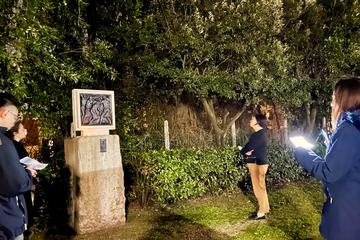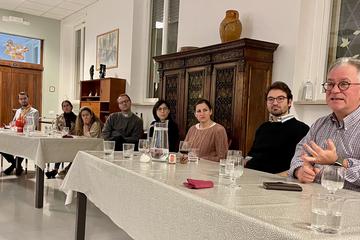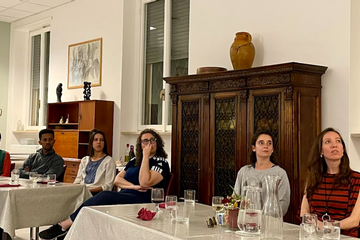
ROME — One of the great joys of living at The Lay Centre is the weekly Wednesday community evening, where priests who work or study in Rome are invited to celebrate Mass, and then engage in discussion with the student community over dinner. Lay scholars and church leaders are oftentimes invited to these community evenings as well. In recent weeks, The Lay Centre welcomed two rectors of pontifical universities and one president of a pontifical institute to the community night.
The rector of the Pontifical Gregorian University, Jesuit Father Nuno da Silva Gonçalves, celebrated the Eucharist April 18. It was his second community evening at The Lay Centre. Born in Lisbon, Father Gonçalves was appointed rector of the Pontifical Gregorian University in 2016. Until then, he was dean of the Faculty of History and Cultural Goods of the Church. He is an expert on Portuguese missionary history and the history of the Society of Jesus.
Two other guests joined the community for Mass and dinner — Dr. Maria Cristina Carlo-Stella, from the Office of the Fabbrica di San Pietro in the Vatican City, and Santiago Pérez de Camino Gaisse, head of the Church and Sport Office of the Dicastery for Laity, Family and Life.
Well-known theologian, musician and musicologist Father Pierangelo Sequeri, director of the John Paul II Pontifical Theological Institute for Marriage and Family Sciences in Rome, celebrated Eucharist with the community May 2.
Commenting on the first reading (Acts 15), Father Sequeri underlined the precious call for universalism that was given to Christianity from its very beginning. He said Christians are too often focused on intra-ecclesial fights that they forget the beauty of the Christian kerygma that they are called to share with others.
He said he wished all Christians could take a week off from their usual obligations and spend the whole time telling the world of the Good News of Jesus Christ.
During dinner, Father Sequeri shared with the students his work at the institute. In the course of the evening, the community discussed the sense of the word “generative.” The conclusion of the discussion was that in a society that is often ego-centric and narcissistic, the Christian must be even more compelled to enter in a relational dimension with what surrounds him or her, and generate something from it — either life, art, thought, missions or projects.
Dominican Father Michal Paluch, the new rector at the Pontifical University of St. Thomas Aquinas (Angelicum), celebrated the Mass May 9. The open window let in the sound of pouring rain, which leant a solemn, yet comforting tone to the liturgy. Like a family telling stories around the fireplace on a winter night, the community gathered around the altar to recount the greatest story ever told. In his homily, Father Paluch shared his reflection on the sermon of St. Paul to the Athenians.
He reminded his listeners of the necessarily evangelical nature of the Gospel, and that St. Paul’s sermon can function as a model for how to share Christ with those whose way of living is different from the Gospel.
He said Christians must first find and praise the goodness in the other, because recognizing the common humanity and good intentions of the other is the only way to build the loving trust necessary for evangelization. Only then can Christians invite others to a transcendent reality, and explicitly share the exhortations of Jesus. He ensured his listeners that, just as St. Paul, most Christians’ attempts will end in failure, but this is no reason to give up. Rather, it is a means by which Christians may be humbled, and thus become better evangelizers by the way they conduct their lives.


